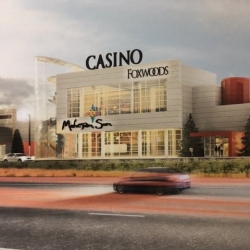Connecticut State Sen. Cathy Osten (D-Sprague) and State Sen. Tim Larson (D-East Hartford) are critical of a bill which would establish competitive bidding for a third casino in the state. Senators Osten and Larson are supporters of the East Windsor casino which state officials have chosen for the satellite casino.
In the summer of 2017, the Connecticut State Legislature gave approval to Foxwoods Resort Casino and Mohegan Sun to build a Hartford-area casino in a joint venture.
Foxwoods and Mohegan Sun are the two casinos in Connecticut, but the multi-billion dollar resorts are located in a different part of the state. At one time, the two rivals’ casinos were among the most lucrative in the world, but market fragmentation means the two tribal casino groups are seeking to maintain their customer bases while both are dealing with $2 billion+ in debt.
Since approval, a deadline for the US Department of the Interior’s Indian Bureau to give approval has passed. The tribes have accused Interior Secretary Ryan Zinke of wrongdoing, because he met with lobbyists for commercial casino operators with ties to the Republican Party, while refusing to give a mandated decision on the East Windsor casino.
Chris Rosario’s Bill
State Rep. Chris Rosario (D-Bridgeport), who represents the Bridgeport-New Haven area, is the one who submitted the bill to the Connecticut House of Representatives. Rosario’s constituents do not live in the Hartford area, so they believe their casino development plans would provide more revenues for the state in the long run.
Rosario used the Interior Department’s lack of approval as his reason for submitting the bill. Because development is delayed, he believes the entire process should be restarted in a proper fashion. Cathy Osten and Tim Larson say Rosario’s plan is doing the bidding of MGM Resorts, whom they believe simply wants to undermine any satellite casino in the Hartford area.
MGM Springfield Lawsuit
MGM Resorts, which is building the MGM Springfield only 30 miles from Hartford, filed a lawsuit claiming the State of Connecticut had not held a competitive licensing process. MGM Resorts claimed its proposal for an MGM Bridgeport casino was never given proper consideration, and thus the Connecticut licensing process is unconstitutional under the state’s own constituion.
Cathy Osten Criticizes Proposal
Osten and Larson believe the current bill, the lawsuit, and the Interior Department’s misconduct are stalling tactics. Sen. Osten said, “If this proposal proceeds — which I doubt it will — I will vehemently oppose it. Connecticut is already on track to open a new tribal casino in East Windsor that will protect existing casino jobs in the state and grow new jobs, which will help our economy, and that progress shouldn’t be derailed.”
The $950 million MGM Springfield is planned for a late-2018 opening, when it would begin to draw casino customers from the Hartford area. Connecticut gambling dollars would begin to flow out of the state to Massachusetts, so Connecticut would lose tax revenues if it had to restart with a competitive bidding process.
Tim Larson Blames MGM Resorts
Sen. Larson, co-chairman of the Connecticut legislature’s Public Safety and Security Committee, accused MGM Resorts of trying to fool the state’s lawmakers.
Larson said, “This proposal is just another attempt by MGM to wave snake oil in front of legislators, and it comes after a year of thoughtful deliberation in which legislators and advocates painstakingly describe the need to preserve existing casino jobs in eastern Connecticut.”
Tribe or Anti-Tribe?
Chris Rosario said he is not “anti-tribe”, but he did call for a 2-year licensing process. By the time that process was complete and a casino was built, MGM Springfield would have a 2 to 3-year window to build a customer base in the Hartford area.
Because the MGM Springfield is going to be a billion-dollar resort and the Hartford mini-casino is going to be significantly less grand, Rosario’s plan risks permanently losing Connecticut gamblers. Of course, Rosario wants to build a Bridgeport casino, so the state can draw gamblers from New York City.

